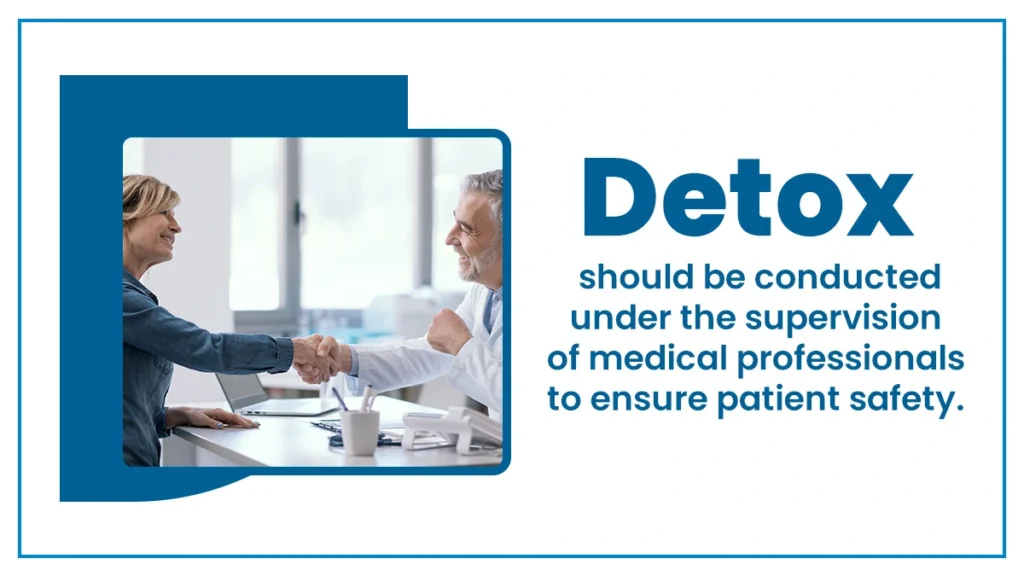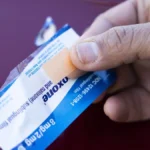Alcohol and drug detox is a critical first step on the journey to recovery, offering a glimmer of hope to those trapped in addiction. Detox is an intense and transformative process that aims to rid the body of harmful substances while providing the necessary support and care for individuals to reclaim their lives.

With its comprehensive approach, detox addresses addiction’s physical, psychological, and emotional aspects, paving the way for lasting sobriety. This powerful process not only breaks the dependency but also opens doors to a brighter future filled with renewed vitality and personal growth.
Key Takeaways
Detoxification is often the first step in addiction treatment. Detox is necessary to stabilize individuals physically and emotionally before moving forward with further therapy and recovery. Here’s what you need to know:
- Alcohol and drug detox removes substances from the body and manages withdrawal symptoms in a safe and supportive environment.
- Withdrawal symptoms vary depending on the substance abused and the severity of the addiction.
- Detox should be conducted under the supervision of medical professionals to ensure patient safety.
Contact The Haven Detox-Little Rock at (501) 271-3342 for professional addiction treatment and care.
Importance of Detoxification
Actively detoxifying can help you achieve a healthier lifestyle. By actively participating, individuals can take control of their well-being and pave the way for a successful recovery.
One key benefit of detox is the removal of harmful substances from the body. Alcohol and drugs can lead to physical and psychological dependence, and detox helps break this cycle. The body can heal and restore its natural balance by eliminating these toxins.
Detox also helps to manage withdrawal symptoms. When individuals abruptly stop using alcohol or drugs, they often experience uncomfortable and dangerous symptoms. Detox programs provide medical supervision and support to help people navigate this challenging phase, ensuring their safety and well-being.
Furthermore, detox serves as a vital foundation for long-term recovery. By starting with a clean slate, individuals can build upon their detox experience and continue their journey toward sobriety. It allows them to address the underlying causes of their substance abuse and develop healthier coping mechanisms to prevent relapse.
Withdrawal Symptoms
Withdrawal symptoms are a challenging aspect of recovery from alcohol or drug addiction. When individuals abruptly stop using substances they have become dependent on, their bodies and minds undergo a series of physical and psychological reactions.
These withdrawal symptoms can vary in intensity and duration depending on the substance and the individual’s level of dependency. In severe cases, physical withdrawal symptoms often include nausea, sweating, tremors, headaches, and seizures.
Psychological symptoms may include anxiety, depression, irritability, insomnia, and intense cravings for the substance. Managing withdrawal symptoms is crucial to ensure the safety and well-being of individuals in recovery.
Medically supervised detoxification programs provide a supportive environment where individuals can receive the necessary care and monitoring during this challenging phase. Medications and therapies may alleviate symptoms, address underlying health issues, and promote a more comfortable withdrawal process.
Choosing Medical Detox or Natural Detox
When deciding to detox, there are two fundamental choices: do you want a medical or natural detox?
Medical detox involves a supervised process where healthcare professionals assist individuals in eliminating toxins from their system.
This method usually occurs in a specialized facility and utilizes medications to manage withdrawal symptoms and ensure a safe and comfortable detoxification process.
On the other hand, natural detox focuses on utilizing natural methods to cleanse the body. This approach often involves making dietary changes, such as consuming organic foods, increasing water intake, and incorporating herbal supplements known for their detoxifying properties.
Exercise and stress reduction techniques are also commonly recommended to support the body’s natural detoxification processes.
While medical detox offers the advantage of professional supervision and medication assistance, it may be more suitable for individuals with severe addictions or specific medical conditions. Natural detox appeals to those who prefer a more holistic and self-directed approach to detoxification.
Ultimately, the choice between medical detox and natural detox depends on individual needs, preferences, and the severity of the detoxification process. Consulting with healthcare professionals can help determine the most appropriate method for a safe and effective detox journey.
How to Aid Detox
Aiding detoxification is crucial for maintaining optimal health and well-being. Individuals can support their body’s natural detoxification by adopting certain lifestyle practices.
Nutrition and Diet
Nutrition and diet play a fundamental role in aiding detoxification. A well-balanced diet rich in fruits, vegetables, whole grains, and lean proteins provides essential nutrients that support the liver, the body’s primary detoxification organ.
Antioxidants found in colorful fruits and vegetables help neutralize harmful free radicals, while fiber aids in eliminating toxins through regular bowel movements. Furthermore, staying adequately hydrated by drinking sufficient water facilitates eliminating waste products and toxins through urine and sweat.
Regular Exercise
Regular exercise is beneficial for overall health and aids in detoxification. Physical activity stimulates blood circulation, promoting the delivery of oxygen and nutrients to cells while enhancing the removal of waste products.
Sweating during exercise also helps eliminate toxins through the skin. Incorporating aerobic exercises, strength training, and yoga into a weekly routine can support the body’s detoxification processes.
Stress Reduction
Chronic stress can impair detoxification and compromise overall health. High-stress levels elevate cortisol, a stress hormone that can interfere with detoxification pathways. Therefore, stress reduction techniques such as meditation, deep breathing exercises, and engaging in activities promoting relaxation, such as hobbies or spending time in nature, are vital for detoxification.
These practices promote a sense of calmness, improve sleep quality, and reduce the burden on the body’s detoxification systems.
Sleep
Sleep plays a crucial role in facilitating detox. During sleep, the brain undergoes a cleaning process through the glymphatic system, which removes toxic waste products that accumulate during wakefulness. Sufficient, high-quality sleep is essential for optimal detoxification and overall health.
Establishing a consistent sleep schedule, creating a relaxing bedtime routine, and ensuring a comfortable sleep environment are key strategies to aid detoxification through adequate rest.
Importance of Psychological Support During Detox
Psychological support plays a crucial role in the process of detoxification. Detox is challenging, and individuals often face emotional and mental hurdles. During this time, active psychological support is essential to help individuals overcome these challenges and maintain their motivation to recover.
Psychological support provides individuals a safe space to express their emotions and concerns. It allows them to process their feelings of anxiety, frustration, and fear that may arise during detox. Through counseling and therapy, individuals can develop healthy coping mechanisms and learn practical strategies to manage stress.
Psychological support helps individuals address underlying psychological issues contributing to their substance use. It assists in identifying triggers and developing relapse prevention strategies. Additionally, it fosters self-awareness and promotes personal growth, empowering individuals to make positive life changes.
Group therapy and peer support groups give individuals a sense of belonging and understanding, reducing feelings of isolation.
Frequently Asked Questions (FAQ)
What to expect after a detox?
After completing a detox process for substance use disorders, you can expect several positive changes in your body and mind. You may experience increased energy levels, improved digestion, clearer skin, and better sleep. Detoxing can also aid in weight loss and help reset your dietary habits.
Additionally, you might notice improved mental clarity, reduced inflammation, and a strengthened immune system. However, it’s important to maintain a healthy lifestyle post-detox to sustain these benefits in the long term. Consult a physician before attempting any detox program.
What is the process of detoxification?
Detoxification is a natural process that helps people with substance use disorders eliminate addictive substances from their bodies. Inpatient treatment centers and detox programs offer services for alcohol use disorder and illegal drugs. Medical professionals supervise patients during detox, providing clinical care and managing withdrawal effects.
The goal is to ensure the safety and well-being of patients while preparing them for recovery. Inpatient detoxification also addresses co-occurring mental health conditions. Treatment programs may include medication and behavioral health care, with physicians playing a crucial role in treating addiction and mental illness.
What are the three methods of detoxification?
Three main methods are tailored to address unique needs during detox. First, alcohol detox focuses on managing alcohol withdrawal symptoms and providing inpatient care within a treatment facility.
Second, drug withdrawal symptoms are addressed through medical supervision, offering a safe environment for individuals.
Finally, family involvement is crucial in supporting the detox process, with staff providing guidance and resources to the individual and their family members. Treatment facilities recognize the importance of involving families in the recovery journey.
Start Your Healing Journey Today with The Haven Detox- Little Rock
Experience a life-changing journey to recovery with The Haven Detox-Little Rock. Our comprehensive addiction treatment services are designed to provide the support and guidance you need to overcome alcohol and drug dependency.
Whether you require detox, residential or outpatient programs, we provide personalized care tailored to your needs. Our detox program focuses on safely and comfortably removing harmful substances from your body and providing a supportive environment for long-term sobriety.
Furthermore, our expert team utilizes evidence-based therapies to address addiction’s physical, emotional, and psychological aspects to ensure effective and sustainable results. Take the first step towards a healthier, brighter future with Haven Detox-Little Rock. Call us at (501) 271-3342 today to begin your journey to recovery.



